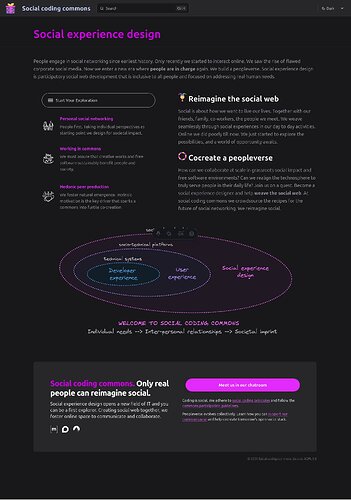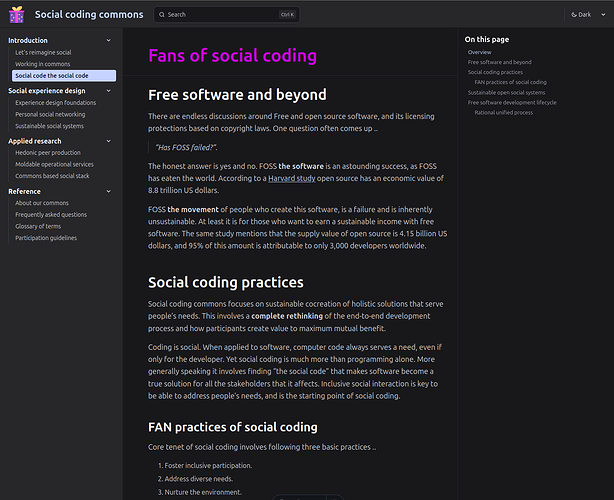SocialHub Policies
Given the Fediverse landscape today I would drop the Community Values Policy and would instead use this Discourse Policies feature in a different manner.
First for a healthy community itself a robust wellbeing track needs to be in place, which SocialHub should re-establish. I am not going into this, but it starts with CoC and builds on that with a whole range of moderation practices and a diverse (culture, ethnicity, skillset) group of people involved in wellbeing procedures.
As @strypey rightfully indicates there are a bunch of impracticalities to using a Policy to reinforce a code of conduct ‘at the forum door’.
At social coding movement instead of a “command” to conduct, there is a “demand” for your participation. A friendlier positioning of things. The movement has adopted guidelines as used by Mozilla and adapted them for its own use:
What is interesting for SocialHub community is that:
- The social coding community participation guidelines is adoptable by anyone.
- Similar to the Contributor Convenant it is a crowdsourced, versioned and evolving artifact.
So SocialHub can adopt this as-is and contribute to its improvement. Even better, social coding is a movement, not a community. Alignment with its ideas is enough to be part of the movement. So SocialHub, in a new positioning towards its future, might consider itself under social coding umbrella. And if that is the case, can benefit from facilities and services provided by the movement’s other direct participants, which are all otherwise independent party.
This “movement” concept is a first step to ensuring that foundational social web technologies can be “of the people, and by the people” i.e. commons-based and evolving according to the needs of the commons. Not the needs of hypercapitalism that a corporate takeover would entail, for instance.
Now on to those Policies..
General participation guidelines are in place. How about richer collaborative relationships which are of much more value, than what casual discussion may bring? Collaboration is the absolute Achilles Heel of the fediverse.
![]() Collaborating involves relying on each other.
Collaborating involves relying on each other.
My minumum requirement for “community” is collaboration, not merely discussion. Here’s where policies can define and reinforce the minimum participation guidelines of various different community processes and practices.
Instead of one Guardian Policy gatekeeping the door of this forum, you get many policies targeted to streamline the efficiency of ongoing community activity. To each policy further workflow can be defined and possibly automated, which would be a great thing to have as an ongoing practice to reduce the boring chores that are killing for a volunteer community.
Proposal and votes
I have a proposal that comes in 3 parts that can be separately improved, approved or rejected ..
1. Community participation
- Adopt https://participate.coding.social community participation guidelines.
- Where necessary help improve this document, so it can serve our whole grassroots movement.
- See: participation guidelines on Codeberg the and discussion topic on social coding forum.
- I am in favor of the proposal, because ..
- I am not in favor of the proposal, because ..
- I am neutral. I am not in favor and not against.
2. SocialHub repositioning
- Reposition (conceptually) SocialHub to be under social coding movement umbrella.
- Social coding movement already considers itself liaisoned to SocialHub.
- Social coding movement’s themes are all complementary to SocialHub’s.
- Social coding movement and SocialHub are ‘values & vision’-aligned.
- Social coding movement raison d’être is to do as movement what community can’t do.
- Social coding movement is about social web based co-creation of the social web.
- I am in favor of the proposal, because ..
- I am not in favor of the proposal, because ..
- I am neutral. I am not in favor and not against.
3. Co-created community policies
- Co-create “Community Policies” in a collaboration between movement and SocialHub.
- Community policies are building block of sustainable software & standards development.
- Social coding movement collects these for a Patterns & Practices library.
- The movement is interested in the design of the concept, SocialHub for its application.
- “Community Policies” become generally available for other projects and initiatives.
- I am in favor of the proposal, because ..
- I am not in favor of the proposal, because ..
- I am neutral. I am not in favor and not against.



